本文
Earthquake Preparedness /地震が 起きる前に すること
地震が 起きる前に すること
お知らせを 見ます
- 市の ホームページを 見ます。
- 市の お知らせが もらえるように 登録します。
- 鴨川市の LINE
- 鴨川市安全・安心メール(日本語だけです。)
家族と にげるところを 考えます。
- 家族と にげるところを きめましょう。
*にげる道を いくつか 考えます。
*家族が 仕事や 学校で 近くに いないとき、どうやって れんらくを とるか 考えます。 - 防災マップを 見ます。
- 親戚や ともだちの 家に 行きましょう。
- 避難所<にげるところ>に 行きましょう。
- 津波が 来ると わかったら、高いところに にげましょう。
- 家族に お年寄りや 赤ちゃん、小さい 子どもが いるとき
*ひとりで にげられない人は、福祉課に 電話してください。(電話 04-7093-7112)
食べもの、飲みものを 家に 準備します。
いつも 家に 7日分の 食べもの、水が あると いいです。
食べ物
- 米や パン
- レトルト食品や 缶詰
- インスタントみそ汁、インスタントスープ
- お湯 または 水で かんたんに 作れる アルファ化米や 乾パン

飲みもの
災害のとき 避難所に 行かないで 家で 過ごすときは 7日分 飲みものが あると いいです。
- 大人 1人 1日 3リットル
- 水を もらうための 給水タンク

燃料
- 卓上コンロ
- 固形燃料
- ガスボンベ(1本 65分くらい 使えます。)

生活で 使うもの
- 毛布
- なべ
- やかん
- フォーク、スプーン、皿、コップ(紙や プラスチックで つくられたもの)
- ラップ
- アルミホイル
- バケツ
- 工具類(ロープ・バールなど)
- 新聞紙
- 布ガムテープ など
- 簡易トイレ〈トイレが ないところや トイレの 水が 流れないときに 使う トイレ〉


にげるとき、持っていくものを 用意します。
非常持出袋〈災害で にげるとき、持っていくリュックなど〉に 次の ものを 入れます。
- 食べものや 水
- 薬
- お金や パスポート・在留カード
- タオル
- マスク、体温計〈体の ねつを はかるもの〉
- 懐中電灯<手で 持つ電灯>
- ヘルメット<上から 落ちるものが あたまに 当たらないように します。>
- 携帯電話、充電器や 蓄電池
- 携帯ラジオ
- 毛布<寝るときに つかうもの>
- 紙おむつや ミルクなど
- スリッパ
など
家の 中の ものに 気を付けます。
地震で、家が ゆれます。タンスや テレビ、冷蔵庫など 大きなものが 動きます。倒れるかもしれません。
とても 危ないです。
- 寝るところの ちかくや ドアの 前に ものを おきません。
- 高いところに あるものは 低いところに おいたり、落ちないように します。
- たんすや 冷蔵庫などが 倒れたり 動いたり しないように します。
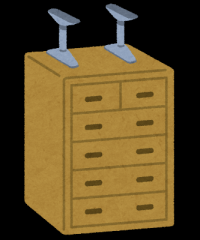
- 家に 火災警報器を 付けてください。煙が 出ると、音で 危ないことを 知らせます。
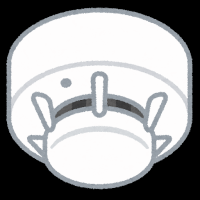
- ストーブや ガスコンロなど、地震で 倒れたり、動いたり したとき、自動で とまるものを 使います。
- 割れた窓ガラスが 飛ばないように フィルムを 付けます。
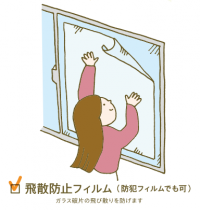
地震が 来たら すること
自分を 守ります。
- 体を 小さく します。
- 机の 下に 入ります。頭を 守ってください。
机が ないとき、クッションなどで 頭を 守ります。 - 地震が 終わるまで 動きません。
本震〈最初の 大きい 地震〉の あとに 余震〈後から 来る 地震〉が 来るかもしれません。
にげる準備を します。
壊れた家の 近くに 行かないでください。壊れた家が 余震で もっと 壊れるかもしれません。
大きい 地震の とき、津波が 来るかもしれません。早く 高いところに にげてください。
山や がけの 近くに 行かないでください。余震で がけが くずれて たくさんの 土や とても 大きい石が 流れてきたり、上から 落ちてきたり するかもしれません。
大きい 余震が あったら、海の 近くから にげてください。
危ないとき、避難所が 開くかもしれません。
にげるとき、非常持出袋を 持っていきます。
あなたの 家が 危ないときで、家族や 友だちの 家が 安全なとき、そこに にげます。避難所に 行かなくても いいです。
家族や 友だちの 家に 行けない人は、避難所に にげてください。
問い合わせ
危機管理課
電話 04-7093-7833
Earthquake Preparedness.
Check Information.
- Check the City Homepage.
- To receive important notice and valuable information, register to the accounts:
- Kamogawa City Line account
- Kamogawa Emergency Alert E-mail Service (alerts are only available in Japanese)
Discuss with your family on where to evacuate.
- Decide on where your family will evacuate.
*Look into road and ways you can use to evacuate.
*Think of ways to communicate with your family in case where they are at work, or in school during disaster. - Check the Hazard Map.
1. Stay with your relatives or friends for the time being.
2. Go to evacuation sites.
3. In case of Tsunami, evacuate to a higher place or building. - When your family consists of elderly, babies, or children.
1. If you are not able to evacuate, please call the Welfare Division (Tel: 04-7093-7112).
Prepare Emergency Supply (Food and Drinks).
It is suggested that you have a prepared emergency supply of foods and drinks enough for 7 days.
Food
- Rice and bread
- Ready-to-eat meals or canned goods
- Instant soups
- Instant rice or hard tack

Drinks
In a disaster, if you decide not to go to an evacuation shelter and stay at home instead, it's good to have enough drinks (like water or tea) for 7 days.
- 3 liters of water per day for an adult
- A water container for receiving water

Fuel
- Portable gas stove
- Solid fuel blocks
- A small gas canister used for portable stoves. One canister lasts about 65 minutes.

Daily necessities
- Blankets to stay warm
- Pots and kettles for cooking and boiling water
- Disposable tableware like plates and chopsticks
- Plastic wrap and aluminum foil
- Portable toilet and bucket for hygiene
- Tools (including rope and a crowbar)
- Newspapers
- Cloth tape can be helpful in many ways.

What to bring while Evacuating:
- Food and Drinking Water
- Any medicine you need
- Money, Passport, Foreign Residence Card
- Towel
- Masks, and a personal thermometer
- Flashlight
- Helmet (something to protect your head)
- Cellphone (and charger)
- Portable radio
- Blankets (used when sleeping)
- For parents: Diapers, milk, etc.,
- Slipper
- Others
Take care of the things inside your house.
During an earthquake, bookshelves, refrigerator, TV, etc. falling and glass breaking may occur. It is very dangerous so please make sure that it is secure and safe inside your house.
- Do not leave any objects that blocks the door or your route for escape.
- Do not put heavy objects on high locations (example: on top of the shelves) to make sure that nothing will fall on you while you sleep or evacuate.
- Secure large bookshelves, cabinets, etc. to prevent it from falling or toppling.
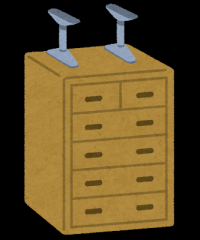
- Install fire detectors. It will alarm you in case when it detects smoke from fire.
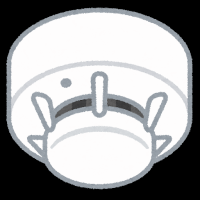
- Use heaters and stoves that automatically shuts off when bumped or during big movements such as an earthquake.
- To prevent glass (from windows, etc.) from breakage or to prevent it from scattering, use a shatter-proof film.
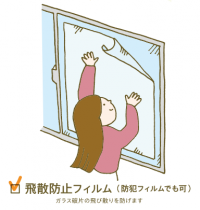
What to do when an earthquake occurs.
Protect yourself during an earthquake.
- Duck or drop down to the floor.
- Cover. Hide under the table and protect your head.
If there is no table around, use a cushion to protect your head. - Hold. Do not move until the shaking stops.
An aftershock may occur.
Preparing to Evacuate.
- Do not go near destroyed houses. Damage will get worse in case of aftershocks.
- During earthquakes, tsunamis may occur as well so please evacuate to higher ground immediately.
- Do not go near mountains and cliffs during and after earthquakes. Soil and big rocks tend to slide down from the top.
- Get far away from the ocean after a strong aftershock.
- The evacuation centers may open during disasters including earthquakes and tsunamis.
- When evacuating, bring your Emergency bagpacks.
- There is no need to go to evacuation sites if your relatives and friends' place is safe. Evacuate there and stay with them for the meantime.
- Those who are not able to evacuate to relative and friend's house, please go immediately to the evacuation site.
Questions
Disaster Management Division
Tel: 04-7093-7833





